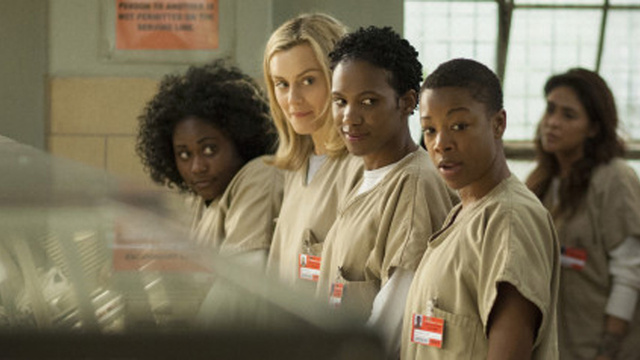 |
| Orange is the New Black |
 |
| Laverne Cox as Sophia |
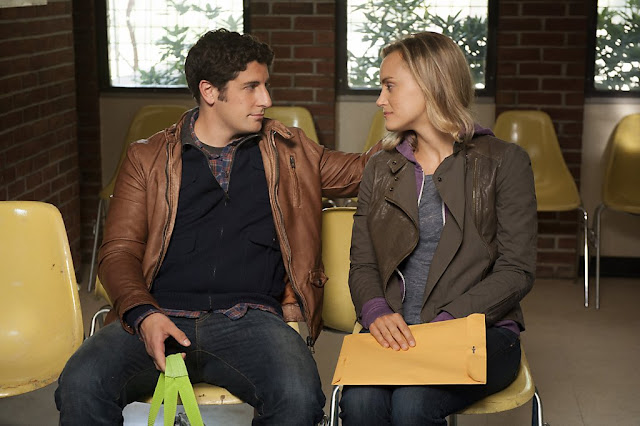 |
| Larry (Jason Biggs) and Piper (Taylor Schilling) |
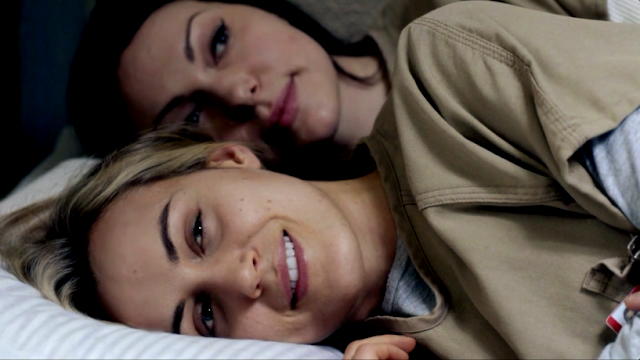 |
| Piper and Alex (Laura Prepon) |
The radical notion that women like good movies
 |
| Orange is the New Black |
 |
| Laverne Cox as Sophia |
 |
| Larry (Jason Biggs) and Piper (Taylor Schilling) |
 |
| Piper and Alex (Laura Prepon) |
The rise of the anti-hero has most TV and media reviewers heralding the past ten years as revolutionary, a “golden age of television.”
And I think it’s true, great television seems to be popping out of the seams of my TV and an ever-expanding “To Watch” list on my desk. In fact, looking at the recent figures for big summer blockbusters (most of which seem to have failed miserably) some (myself included) are wondering if Hollywood studios might be fading into the shadows of networks such as AMC and HBO.
TV, because of its much longer time allowances (12-20 hours of viewing per season) and recently-improved watching options (Hulu, Netflix, DVD releases and, let’s face it, illegal streaming and downloading) seem to create far more interesting characters and way more space for subtle scheming and intrigue in their plot lines. Increasingly, Hollywood opts for a bigger explosion to counteract its total lack of originality and character development.
So, in a word, I would argue yes, I find higher quality entertainment and better stories about life and humanity in television than I do at the movies.
But I don’t see many women in these shows either.
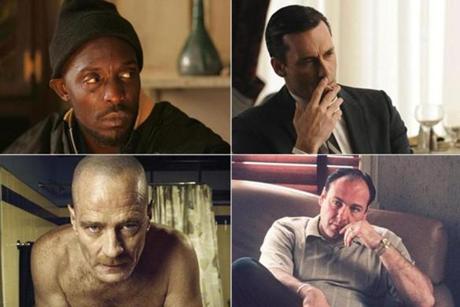 |
| Some of Brett Martin’s “Difficult Men” |
 |
| Claire Danes as Carrie Mathison in Homeland |
Do audiences consider stories with female protagonists un-relatable? Uninteresting? Too unbelievable? Or does this lack merely reflect life in that there aren’t any women doing enough “complex” and “darkly-human” things to model the character after?
I don’t believe any of that is true, but that doesn’t change the amount of women headlining an AMC show. In thinking about my favorite shows, I can only think of a few female characters that I would consider unique and groundbreaking. Consider Breaking Bad: while Skyler is an interesting enough character, she’s far less compelling (and obviously secondary) to the character development that Walt is showcasing, often being seen as no more than a “nag” or “hen-pecking shrew” to many viewers (not this one). In fact, the backlash against Skyler (Anna Gunn) has been so intense (consider the meme below as a common example of how the internet seems to view the poor woman) that Gilligan actually addressed the problem in a recent interview.
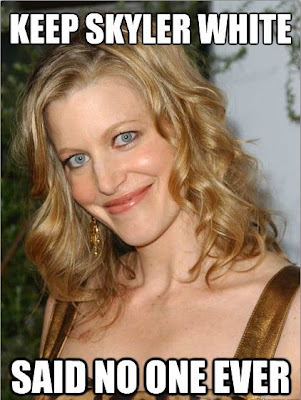 |
| One of the nicer internet memes for Skyler White (Anna Gunn) |
So ladies, either we are far too flat and boring to be on TV, or as it has been for so long, our stories and interactions are still being undervalued. Therefore, we should set some goals for ourselves: be marvelously interesting (sarcasm) and (more importantly) continue to write, produce, direct and support more TV shows about women–because I don’t see many others doing it for us.
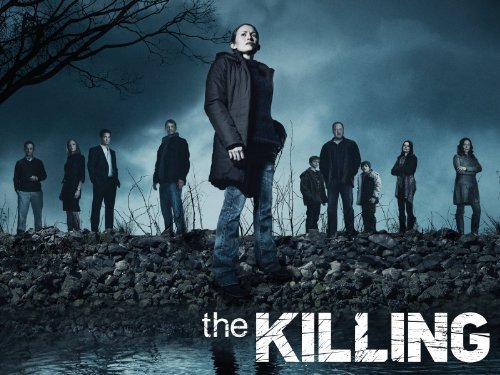 |
| The Killing promotional still. |
Written by Leigh Kolb
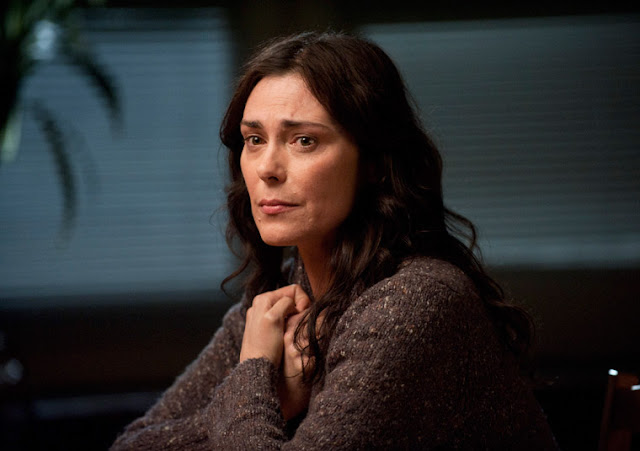 |
| Mitch Larsen: bad mother. |
“Her daughter may or may not have been a prostitute or involved in some illegal doings at a casino. And she ended up dead seemingly because of it. But instead of hunkering down and paying more attention to her remaining children, Mitch left her sons to be raised by a depressed father and their hooker aunt while she went off to live in a motel and act creepy around wayward runaway girls.”
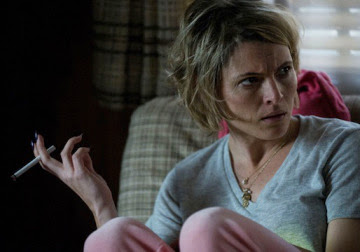 |
| Danette: bad mother. |
While these supporting characters’ relationships with their daughters are troubled, and it would be easy for the audience to “blame” the victimization of the daughters on their mothers, it wouldn’t be correct. We are so used to complex, fallible male characters that we are also conditioned to see them as complex and fallible, not good or evil. When we’re presented with women with the same depth of characterization–especially mothers–we don’t know what to do except what we’ve been conditioned to do: criticize them and blame them.
This is blatantly obvious when we consider the show’s protagonist, detective Sarah Linden (played by the amazing Mireille Enos).
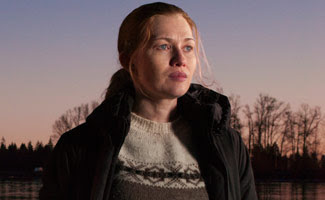 |
| Sarah Linden: bad mother. |
“We all struggle with the work-life balance thing, and detective Sarah Linden is hardly an exception. Finding time to mother her son, for instance, seems to be a challenge. Jogging, however, she manages to squeeze in. And it’s a good thing, too. Because Linden (finally) got a major break in the case this week, and it’s all thanks to the fact that she prioritizes cardio over sleep, parenthood, marriage, friendship, or updating a sweater collection that appears to have been sourced from Dress Barn circa 1997.”
“But she’s still the World’s Worst Mother — her son lives in Chicago and she won’t visit because, well, he’s the only person she knows there. Wow, Linden. Just, wow.”
In a Salon review from last year (which, remarkably, denounces The Killing for not being “fun” enough), the reviewer slips in, “Yes, it’s still raining, and Linden’s still a bad mother…”
“Sarah Linden refuses to accept that her inattentiveness is gravely affecting her son until she is forced to reckon with her absence around him. And in Mitch Larsen (Michelle Forbes) we bear witness to a character who is present in her daughter’s life and yet still positioned at a significant remove from the darkest secrets of her adolescence. In the end, of course, this is the scariest aspect of all.”
At Bitch Flicks, Megan Kearns posted in the first season how it was “refreshing” to see this kind of character trying to navigate her different roles, and that “the lead character is an accomplished single mom striving to keep her son out of trouble all while maintaining her demanding career.” She manages to do that by the third season, but it’s still not good enough.
Instead, audiences and critics alike focus much too closely on the female protagonist’s failings as a mother. We do not do that with male protagonists. (OK, six seasons in, after an episode highlighting parenting, Jezebel posted about how Don Draper was a “shitty dad.”)
Is Dexter a good father? What about Rick Grimes? Walter White?
Certainly there are lists of “bad dads” in TV/film, but the tone is different, more tongue-in-cheek. And a focus on these characters’ fathering abilities doesn’t run throughout conversations about the show, especially not with the same venom we see about Linden. When there’s a bad father in the mix, it’s just a poignant piece of a Joseph Campbell hero’s journey. Bad mothers, however, deserve to be burned at the proverbial stake.
There is a dearth of female antiheroes in film and television. The response to Sarah Linden shows why this is. When audiences see female characters, they think primarily in critical terms, especially about their roles as mothers and wives. (Of course this extends past fictional characters; there’s consistent and persistent hand-wringing about real-life women working too much and not being good enough mothers.) Women aren’t perfect (especially within the narrow confines of perfection that our society has put in place). Female characters shouldn’t be perfect.
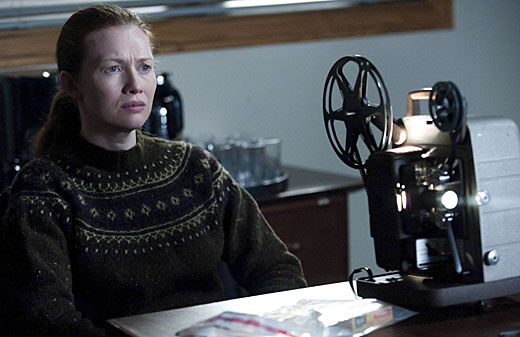 |
| My son is doing fine and my sweaters are warm and comfortable, assholes. |
Linden’s role as a parent, girlfriend and ex-wife is just one small part of the grand scheme of the show. Her partner, Stephen Holder, has a girlfriend this season. He forgets Valentine’s Day and is never home. He is not painted as a villain, because he’s out getting shit done. He’s doing his job. That is what is important in The Killing. So when critics focus (in depth, or just in passing) on how terrible a mother Linden is, that further erodes what should be good about having strong, complex female characters.
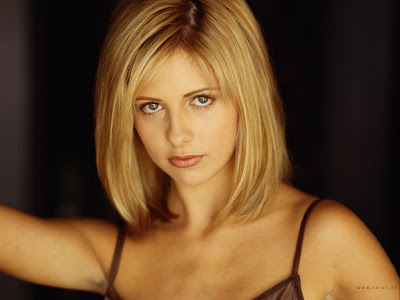 |
| Sarah Michelle Gellar as Buffy Summers |
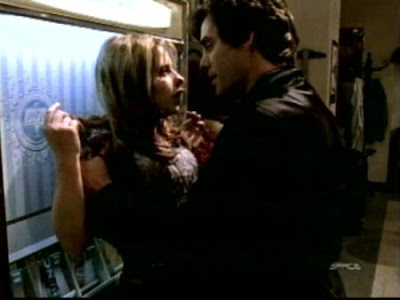 |
|||
| Xander (Nicholas Brendon) attacks Buffy while possessed |
“Xander isn’t accountable for what he said or did under the hyena possession. I think unintentional, accidental possession by demonic spirits is about as extenuating a circumstance you can get … I do, however, think that the attempted assault scene reveals something less than pleasant about Xander’s character. No, he would never attack Buffy when he was in his right mind, but he does believe that she’s attracted to dangerous men–that if he were dangerous and mean, she would be attracted to him.”
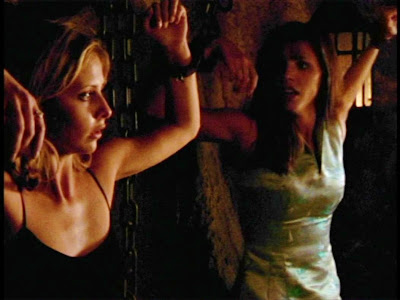 |
| Buffy and Cordelia (Charisma Carpenter) wait in terror for the frat boy demon to arise |
“Even before this scene, we knew that Richard was a bad guy and that the Delta Zeta Kappa guys were up to no good, but we were also led to believe that Buffy’s date, Tom, was the nice guy of the group. We think he’s the only good one of a group of potential rapists, and when he pulls Richard off of Buffy’s unconscious body, our initial inference is confirmed–until we see that Tom is just as bad as the rest, if not worst of all. He was only pretending to be nice to make Buffy trust him. The message is clear: even guys who pretend to be nice and unassuming can be dangerous, and you can’t assume that a self-deprecating ‘nice’ guy is actually a good guy.”
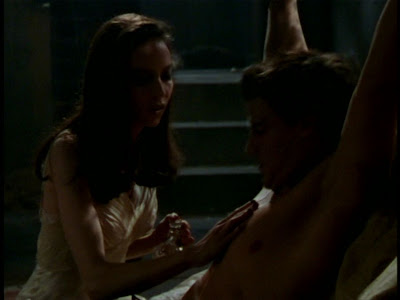 |
| Drusilla (Juliet Landau) begins her torture of Angel (David Boreanaz) |
“I’ve often thought that Drusilla is the most tragic character on Buffy, and that’s largely because of her relationship with Angel. I think her obsession with Angel is a commentary on molestation and Stockholm Syndrome. I’m not sure how old she was when Angel and Darla turned her into a vampire, but these episodes and a few flashbacks on Angel indicate that she was pretty young, maybe on the verge of turning eighteen. However old she was, the point is that she was ‘pure, sweet, and chaste’–qualities that made Angel obsessed with her, made him want to corrupt her innocence.”
 |
| Buffy and Angel, shortly after escaping death and before sleeping together |
“Even though Buffy and Angel sleeping together is wrong from a legal perspective, I have a hard time categorizing this incident as rape. Defining it as rape would rob Buffy of her agency in making that choice to sleep with Angel. She knew exactly what she was doing in the heat of the moment. She wasn’t under the influence of anything, she wasn’t hesitating for a second, and she wanted it to happen … At the same time, Buffy is barely seventeen, and Angel is two hundred and forty. Angel having sex with Buffy at her age and her level of experience is … well, it’s a little gross.”
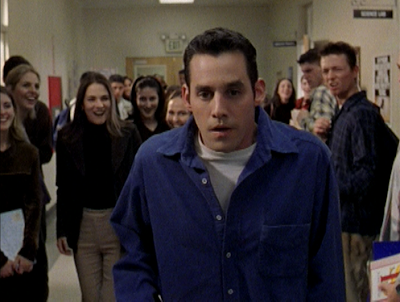 |
|
| Xander walks down the hallway with every girl in Sunnydale High ogling him |
“Xander temporarily making Cordelia fall in love with him just so he can break her heart is gross, cruel, and inexcusable (even though I do empathize with his hurt feelings). But imagine if he had wanted Cordelia to love him forever, if the love spell had worked and was permanent, that he slept with her, married her, spent his life with her, all while her feelings for him weren’t real. A temporary love spell for the purpose of revenge is stupid and malicious, but a permanent love spell inspired by ‘pure’ intentions is a much, much bigger violation of consent and autonomy. Yet the second of the two would be considered more ‘romantic’ in our society.”
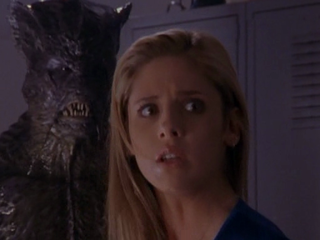 |
|||
| Buffy worries more for her reputation than her safety |
“This episode has a lot of victim-blaming and slut-shaming. Buffy is the one who is attacked, but she’s blamed for dressing inappropriately. She defended herself–something that assault victims are always encouraged to do–but only further incriminates herself in the process. Sure, Cameron does have a broken nose, and Buffy doesn’t appear to be injured, but his word is automatically taken over hers. He’s worth more to the school administration. He’s a successful athlete who brings acclaim and honor to the school, and she’s a violent troublemaker. Buffy’s not the ‘right’ kind of victim.”
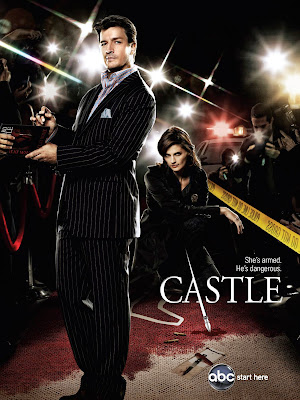 |
| Castle in on ABC. |
Written by Janyce Denise Glasper
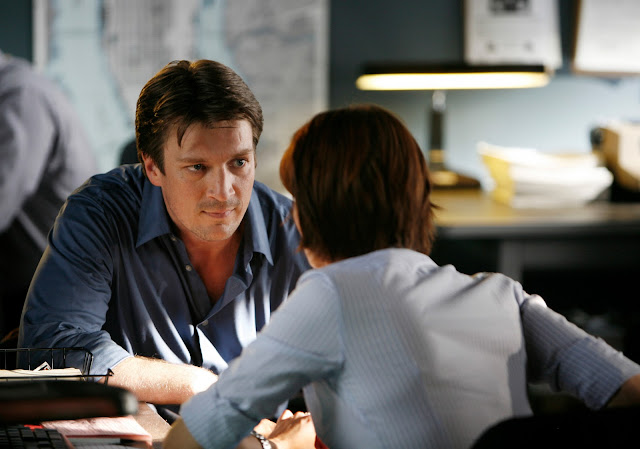 |
| Castle (Nathan Fillion) is a little too enthused over being interrogated by Kate (Stana Katic). |
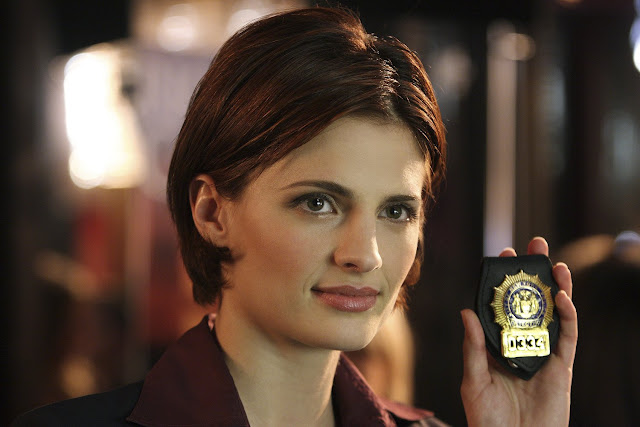 |
| Kate (Stana Katic) flashes her badge of honor. |
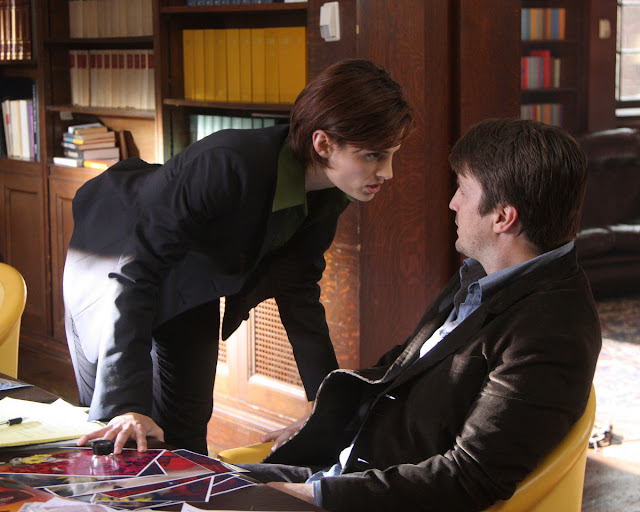 |
| Everyone wants Beckett (Stana Katic) to date Castle (Nathan Fillion) because he follows her around like a puppy. |
This irksome moment defined Castle’s selfishness and vanity. Prior to the finale, in the episode Overkill, his ego wanted to win a case and went to battle with Demming in a disgusting showing of oversized macho testosterone. The finale further revealed just how vile his intentions were and made him pretty much unlikable for a strong woman like Kate.
Starting June 16th, the next great gratifyingly guts and love HBO show will be up and running with ten episodes pleasantly filled with Eric Northman (Alexander Skarsgard), Bill Compton (Stephen Moyer), and Alcide Herveoux (Joe Manganiello); while the show has a normal run of twelve episodes a season, it’s been shortened to a soul-crushing ten due to Anna Paquin’s pregnancy.
As a little recap, season five ended with Eric yelling, “Sookie, Run!” after the creation of Billith, the lovable Bill turned into a religious vampire fundamentalist who drinks the ancient blood of Lillith and becomes an evil liturgical nightmare.
 |
| Artwork of Lillith |
As a feminist, I find it fascinating that Lillith was chosen as the starting point for the vampire religion. In the original legend of Lillith, she was created before Eve to be Adam’s wife, but she refused to be Adam’s “slave” and so rebelled against god, left the Garden of Eden and then slept with Satan. She gave birth to many children by Satan, but when god demanded she give them to him she refused. Therefore, like so many female mythic figures (and modern day ones) she has been cast as either a demonic prostitute or as a great mother figure who protects children, more commonly known as the angel on the hearth.
True Blood is a show that has consistently dealt with some of the more mythological and pagan representations of women: Holly (Lauren Bowles) as a good witch; Marnie (Fiona Shaw) and Antonia in season four as the sometimes bad, sometimes good witches; Maryann (Michelle Forbes), as the evil ancient maenad in season two; and a whole host of good, bad and flighty fairies throughout the entire show.
Of course on the surface, True Blood gets a reputation as a vampire romance with lots and lots of sex; however, the show in general has powerful themes: religious fundamentalism, terrorism, racism, homosexuality, and even PTSD. Todd Lowe and his gentle search for earthly normalcy provided a great counterpoint to the search for supernatural artifacts or dominion of the other characters. Also, Lafayette (Nelsan Ellis) is one of the most interesting homosexual characters on television; Ellis plays the role with a physical masculinity but with a more feminine wardrobe and a flamboyant sexuality. For me, Ellis’ masterful acting as a playful joining of genders and stereotypes is able to move away from a trite rehashing of more mainstream representations of homosexuality. (Note: The following clip, while representative of Ellis’ fine powers of gender melding, also contains explicit language. NSFW.)
We also have to recognize the incredibly kick ass soundtracks that the producers bang out over every season: Beyond the bland mixes of generic pop music of most shows, True Blood features punk rock, country, folk music, fabulous jazz and sleazy hip hop in a brilliant mashup. It also has in my opinion, one of the best, if not the best, opening sequences of any tv show.

The cast of True Blood
So, on to season six: what can we expect? Spoilers and rumors to follow.
Sookie and Jason: Looks like Sookie and Jason are on the trail for Warlow (Rutger Hauer), the mysterious vampire who killed their parents and to whom Sookie was apparently promised. Sookie also looks like she’s coming in to her own and letting someone (Bill? Eric?) know she doesn’t belong to anyone and that she’s getting sick of the way her life is going.
Eric and Sookie: Eric and Sookie look like they’re getting it on in a few scenes and beyond that, Eric looks sweet, and sexy and amazing. Perhaps this season we’ll get to see him in the heroes’ role as he realizes the best parts of himself? Also, apparently Nora isn’t just his sister? Supposedly, there’s a little bit more of a secret there than we originally thought. Bigger than all of that though, is the rumor that Eric might meet the true death in this season, which if that happens, would entirely change the course of the show.
On a side note however, the show has received some criticism for its unwillingness to kill off major characters, so while I think that Eric dying is a low possibility, (though Skarsgard’s career has been gaining recently; he might want to move on to other projects) perhaps that’s why the show might be ready to take the plunge of major character death? Also, consider this season’s tagline “No one lives forever.”
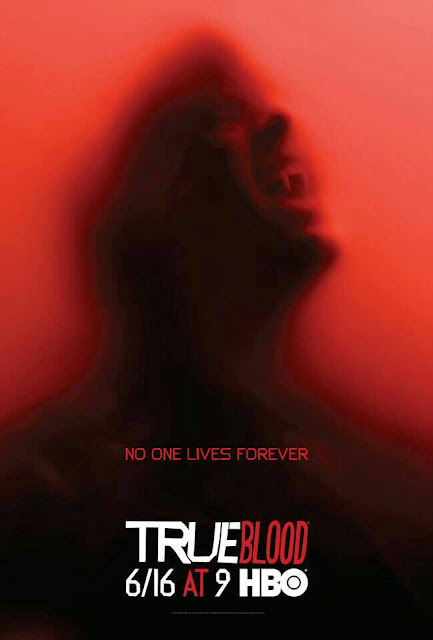 |
| True Blood Season 6 and tagline |
Pam and Tara: Pam and Tara will continue their relationship and the two definitely seem to be going it alone. However, I have heard that Tara has a near-true-death experience, which we hope will only be an experience and not a permanent change.
On a happy note, everyone’s favorite pastor family is back with Sarah Newlin (Anna Camp) and Steve Newlin (Michael McMillian), and Sarah looks like she’s probably gonna be a badass.
Trailer #2
Trailer #1
What do you think will happen this season? Is it time for a main character to die?
 |
| Orphan Black poster |
This is a guest post by Ms Misantropia.
 |
| Sarah kicking ass |
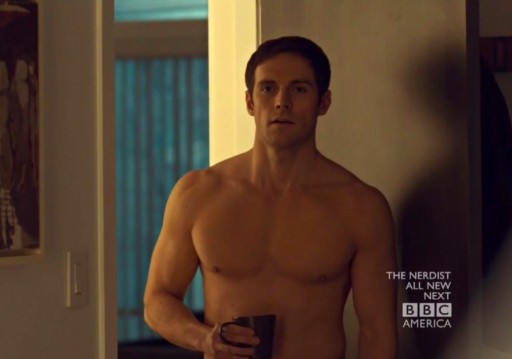 |
| Paul with his morning coffee |
 |
| Helena, one of the clones |
With a more diverse and equal viewing experience also comes portraying other characters and relationships than just white straight people. Orphan Black has one main character — Art, Beth’s detective partner — and three other characters who are black, and it has two regular Latina/o characters. The show has not yet made it onto GLAAD’s LBGT characters list but I suspect it is only a matter of time, since two of the main characters are gay — Felix and Cosima — and they are both getting a lot of screen time in every episode.
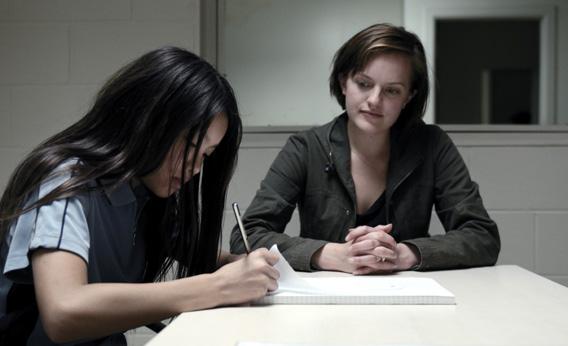 |
| Jacqueline Joe as Tui and Elisabeth Moss as Robin Griffin in Top of the Lake |
You know there’s a Maori legend about this lake… that there’s a demon’s heart at the bottom of it; the beats makes the lake rise and fall every five minutes.
 |
| Top of the Lake‘s “Paradise”–a piece of land where a women’s commune lives |
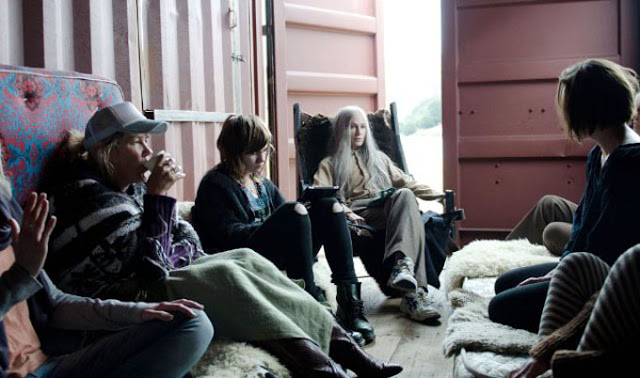 |
| Holly Hunter as GJ in Top of the Lake |
There’s a Maori legend about this lake that says there’s a demon’s heart at the bottom of it. It beats; it makes the lake rise and fall every five minutes. There was a warrior that rescued a maiden from a giant demon called tipua. And he set fire to the demon’s body while it slept and burnt everything but his heart. And the fat melting from the body formed a trough. And the snow from the mountains ran down to fill it, to form this lake.
 |
| Robin in Top of the Lake |
 |
| A brand new start for the young set of One Life To Live. (pictured: Andrew Trischitta as Jack, Laura Harrier as new Destiny, Kelley Missal as Dani, and Robert Gorrie as new Matthew) |
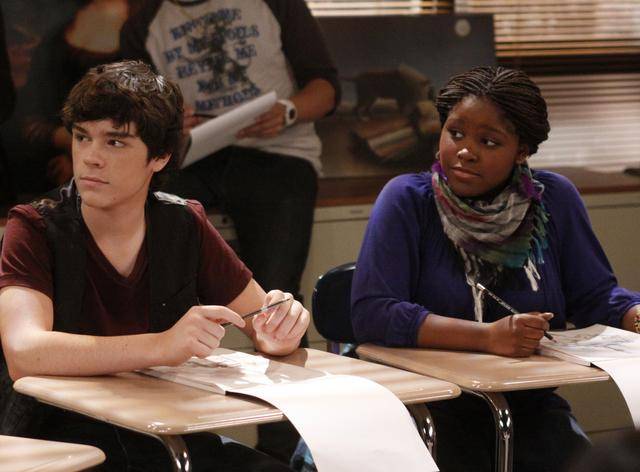 |
| High school sweethearts–Matthew Buchanan (Eddie Alderson) & Destiny Evans (Shenell Evans). |
 |
| Shenell Evans’ school schedule prevented her return to her NAACP nominated role. |
 |
| Laura Harrier is the new Destiny. |
 |
| Dani Manning (Kelley Missal) and her boarding school friend, Matthew (Eddie Alderson). |
 |
| A disoriented Dani (Kelley Missal) awakens from her near drug overdose ordeal. |
 |
| Don is being closed in on this season. |
Written by Leigh Kolb
At the Women’s Convention in Akron, Ohio, in 1851, Sojourner Truth said,
But man is in a tight place, the poor slave is on him, woman is coming on him, he is surely between a hawk and a buzzard.
 |
| Don reading The Inferno. Dante’s journey though hell is not unlike Don’s perception of life this season. |
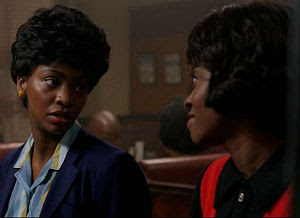 |
| Dawn briefly speaks to her friend about being a black woman in a very white area and industry. |
 |
| Something is missing, Don. |
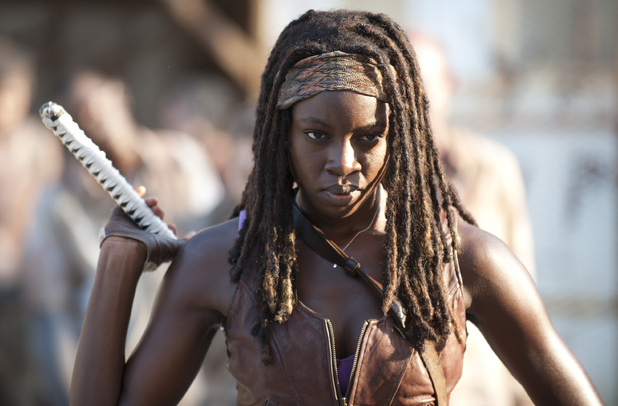 |
| Michonne in The Walking Dead |
Written by Megan Kearns | Warning: spoilers ahead!
So the season 3 finale of The Walking Dead. What can I say? Is there less sexism than last season’s appalling anti-abortion storyline with Lori’s pregnancy? Did the addition of badass Michonne change the gender dynamics?
It’s also interesting to note that the writers changed the sexual assault survivor from a black woman to a white woman. Too often, the media erases the narratives of black women rape and assault survivors, choosing to focus on white women survivors.
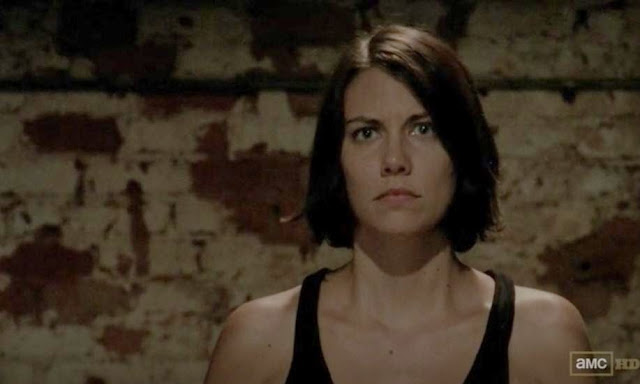 |
| Maggie in The Walking Dead |
 |
| Lori and Carl in The Walking Dead |
“I don’t mean to sound sexist, but as far as women have come over the last 40 years, you don’t really see a lot of women hunters. They’re still in the minority in the military, and there’s not a lot of female construction workers. I hope that’s not taken the wrong way. I think women are as smart, resourceful, and capable in most things as any man could be … but they are generally physically weaker. That’s science.”
While many women orchestrate machinations behind the scenes, no woman is openly a leader, boldly challenging patriarchy to rule. Except for one. Daenerys Stormborn of House Targaryen.
 |
| Emilia Clarke as Daenerys in Game of Thrones |
Written by Megan Kearns for our Infertility, Miscarriage and Infant Loss Week. | Warning: Spoilers ahead!
When I first wrote about Game of Thrones two years ago, I wrote about its vacillation between showcasing strong, intelligent female characters and its sexist objectification and misogynistic rape culture.
I received an exorbitant amount of comments on my criticism of the show — even though I simultaneously lauded its brilliant acting and interesting characters and dialogue. Some told me I didn’t understand anything about the show. Others told me to wait, just wait as it would get better. While the show suffers serious problems, particularly in its sexposition and depiction of graphic female nudity, as the show has progressed, it has indeed become more and more feminist.
We witness more of the women expressing their disdain for their lot in life due to their gender. We see women buck gender norms (Arya, Brienne, Yara Greyjoy) and we see women scheme to surreptitiously assert their power (Margaery Tyrell, Cersei Lannister, Olenna Redwyne) or even just to better their lot in life (Shae, Ros, Sansa).
While many women orchestrate machinations behind the scenes, no woman is openly a leader, boldly challenging patriarchy to rule. Except for one. Daenerys Stormborn of House Targaryen.
When I first wrote about Dany (Emilia Clarke), I was captivated by her. She drew me in immediately and became my favorite character. I loved watching her transformation from meek and timid, bullied by her creepy brother Viserys, to a powerful yet kind-hearted Khaleesi (Queen). Each episode she grows more bold and assertive. Yet she continually strives to be fair and just. Watching her growth has been the most enjoyable aspect of the series.
Daenerys marries Khal Drogo in an arranged marriage in order to secure Viserys, rightful heir to the Iron Throne after the murder of their father the king, an army so he can claim the throne. Viserys uses Dany, telling her he would have all 40,000 Dothraki rape her if it garnered him an army. Nice guy.
After a rapey wedding night (Sorrynotsorry, fans. It is), Daenerys and Drogo eventually form a bond and fall in love with one another. (I know, I know, but bare with me). Dany grows more confident and assertive both with her sexuality and her authoritativeness in giving the khalasar (clan or tribe) commands. Months later, when Viserys hits her, she hits him back and tells him if he strikes her again, she will have his hands cut off.
When Dany becomes pregnant with a son, she eventually convinces her husband to cross the sea, something the Dothraki fear, in order to claim the Iron Throne and rule. Both Daenerys and Drogo believe their son Rhaego will be the heir to the throne, calling him the “Stallion Who Mounts the World,” because according to a Dothraki prophecy he will be a great khal (king) of khals, uniting the Dothraki as one khalasar (clan or tribe) and conquer the world.
 |
| Game of Thrones |
After Khal Drogo’s khalasar conquer a village, Daenerys — growing more confident and outspoken — prevents the men from raping the enslaved women. When challenged by her husband, she boldly defends her decision, trying to advocate for the women’s rights. Rather than crediting his wife’s penchant for advocacy, Drogo tells her she grows fierce as their son grows in her womb, “filling her with fire.”
But after her husband has a wound, Mirri Maz Duur an enslaved shaman whose life Dany spares, treats his injury. Yet he falls deathly ill. Mirri tells Dany how to save him, by using blood magic, something forbidden by the Dothraki. Dany follows her instructions. Yet she goes into labor and passes out. When Dany awakens, her advisor Jorah tells her that her son was born dead and deformed with scales. She’s been “rewarded” by having Drogo a shell of his former self in a catatonic state. When Dany confronts the shaman, asking when she will be reunited with her husband, Mirri replies:
“When the sun rises in the west and sets in the east. When the seas go dry and mountains blow in the wind like leaves. When your womb quickens again, and you bear a living child. Then he will return, and not before.”
Mirri’s spell took the life of Daenerys’ unborn son as revenge for the Dothraki attack on her village. Also inherent is an infertility curse, that Dany will not have any of her own children. She loses the lives of both her husband and her unborn child.
With nothing left to lose, Daenerys resolves to make a bold and drastic decision which showcases her resolve and empowerment. As Angela Smith wrote on bereaved mothers at Bitch Flicks:
“It’s not uncommon for women to feel empowered to make drastic changes after losing a child. They may, understandably, become far less tolerant of others due to the realization nobody at all can break them down any further than they’ve already been broken.”
Dany has one of her Khalasaar place 3 dragon eggs she was given as a wedding present on the pyre. As the fire burns, she steps into the flames, despite the protestations of Jorah. In the morning, a new day has dawned. Dany emerges from the ashes unharmed, and the eggs have hatched with the 3 dragons perched on her body.
 |
| Daenerys becomes the Mother of Dragons |
But now that she has lost her son, Daenerys decides she will take the Iron Throne herself and rule the Seven Kingdoms. After all the men in her life — her husband, son and brother — have died, she claims the throne for her own.
Dany becomes the metaphorical phoenix rising from the ashes, purging the last vestiges of her former timidity to transition into her life as a powerful leader.
At the end of season one, I’ll admit I worried that her magical powers were somehow explaining away her awesomeness. But now I see that no, it’s merely to highlight the importance of her role in Game of Thrones — as a woman leader challenging sexism.
Daenerys is continually called the Mother of Dragons, spoken with awe and reverence. In many cases, women are allowed to lead or be ruthless as lioness mothers. And while Dany lost her son, and she may be cursed with infertility by Mirri, she still remains a mother figure. She envisions herself as the mother to her 3 dragons. In the second season’s episode “Prince of Winterfell,” Dany’s dragons are kidnapped in the city of Qarth. When Jorah tells her to abandon them, that they are not her children, and escape, Dany replies:
“A mother does not flee without her children…They are my children, and they are the only children I will everhave.”
Daenerys risks her life to save her dragons, and they save her life and free her when she’s captured as well. The mysterious masked woman Quaithe tells Jorah that “dragons are fire made flesh…and fire is power.” Daenerys has given birth to power. Power contains a duality – it can subjugate and torment or it can crush oppression and yield justice.
Speaking with confident assuredness, Daenerys tells those that doubt her:
“When my dragons are grown, we will take back what was stolen from me and destroy those who have wronged me! We will lay waste to armies and burn cities to the ground!…I will take what is mine, with fire and blood!”
In season 3, after having survived the treacheries in the city of Qarth, Daenerys looks to procure an army in the city of Astapor in order to take the Iron Throne. Despite her steeliness, she has not lost her kindness. She tries to give water to a dying slave. She doesn’t hide her horror and disgust during negotiations when she hears that murdering a newborn in front of the infant’s mother is a component of the training for the highly skilled slave warriors, the Unsullied. To her advisors, she expresses her unease over buying slaves for an army. She doesn’t want the “blood of innocents” on her hands.
 |
| Daenerys with advisors Ser Jorah Mormont and Ser Barristan Selmy |
In last week’s episode “And Now His Watch Is Ended,” Game of Thrones turned a corner in perhaps the most feminist episode of the series.
Daenerys makes a trade for all 8,000 Unsullied warriors, appearing as if she’s going to give up her dragon Drogon to make the exchange. But it’s all a ruse. When the brutal slaver Kraznys — who has insulted Dany with sexist, slut-shaming insults, erroneously thinking she didn’t understand the Valeryian language — is irritated that her dragon doesn’t obey him, she retorts that of course he doesn’t, “a dragon is a not a slave.” Dany then orders the Unsullied, now in her command, to murder the slavers and break the chains off the slaves. She frees the enslaved warriors, asking them to fight for her as free men. Daenerys then drops the whip equating ownership of the slaves. In essence, she drops the symbolic weapon of tyranny and oppression, heralding rebellion.
If there was ever any question, Daenerys is clearly here to dismantle the patriarchy.
Not only is she a woman leader, her very existence challenging the status quo. But Daenerys openly questions and challenges patriarchal norms. She refuses to abide by societal gender limitations mandating men must rule. She’s determined to forge a different path. Rather than follow in the footsteps of leaders embodying toxic masculinity, she’s determined to rule through respect, kindness and fairness — not through intimidation or fear. Daenerys refuses to enslave people. She wants to emancipate them.
The Mother of Dragons cares for the dragons as if they were her own babies. Could it be that Daenerys will become the archetypal mother of humanity? Perhaps. She’s wielding justice, crushing oppression and protecting the weak. Yet it is the loss of her son that enables Daenerys to envision herself in the role of leader. No longer is she supporting a man to be a great leader. She has become that leader.
The princess has become a queen.
 |
| Dany being a badass. Boom. |